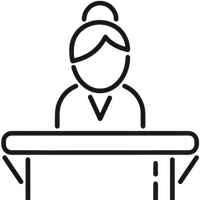Speaker Profile
Biography
John's work aims to improve research methods and practices and to enhance approaches to integrating information and generating reliable evidence. Science is the best thing that can happen to humans, but doing research is like swimming in an ocean at night. Science thrives in darkness. Born in New York City (1965), raised in Athens. Valedictorian (1984), Athens College; National Award, Greek Mathematical Society (1984); MD (top rank of medical school class) from National University of Athens (1990); also received DSc in biopathology from same institution. Trained at Harvard and Tufts (internal medicine, Infectious diseases), then held positions at NIH, Johns Hopkins, Tufts. Chaired the Department of Hygiene and Epidemiology, University of Ioannina Medical School (1999-2010) while also holding adjunct professor positions at Harvard, Tufts, and Imperial College. Moved to Stanford in 2010, initially as DirectorC.F. Rehnborg Chair at Stanford Prevention Research Center, then diversified with appointments in 4 departments and membership in 8 centersinstitutes at Stanford. Launched the PhD program in Epidemiology Clinical Research and the MS program in Community Health Prevention Research. Launched METRICS in 2014. NCINIH Senior Advisor on Knowledge Integration (2012-6). President (2023-4), Association of American Physicians. President, Society for Research Synthesis Methodology. Editorial board member of many leading journals (including PLoS Medicine, Lancet, Annals of Internal Medicine, JNCI, many others) and Editor-in-Chief of European Journal of Clinical Investigation (2010-2019). Delivered 700 invited and honorary lectures. Recipient of many awards (e.g. European Award for Excellence in Clinical Science 2007, Medal for Distinguished Service, Teachers College, Columbia U 2015, Chanchlani Global Health Award 2017, Epiphany Science Courage Award 2018, Einstein fellow 2018, Gordon award 2019, Albert Stuyvenberg Medal (2021), Harwood Prize 2022). Inducted in Association of American Physicians (2009), European Academy of Cancer Sciences (2010) American Epidemiological Society (2015), European Academy of Sciences and Arts (2015), National Academy of Medicine (2018), Accademia delle Scienze (Bologna) (2021). Honorary titles from FORTH (2014) and Ioannina (2015), honorary doctorates from Rotterdam (2015), Athens (2017), Tilburg (2019), Edinburgh (2021), Thessaloniki (2023), McMaster (ceremony 112024). Multiple honorary lectureshipsvisiting professorships (Caltech, Oxford, LSHTM, Yale, U Utah, U Conn, UC Davis, U Penn, Wash U St. Louis, NIH, Cedars-Sinai among others). The PLoS Medicine paper on Why most published research findings are false is the most-accessed article in the history of Public Library of Science (3 million hits). Author of 9 literary books, three of them shortlisted for best book of the year Anagnostis awards in Greece. Latest book (in English, published in 2022) is 2 books hyperlinked to each other. Brave Thinker scientist for 2010 per Atlantic, may be one of the most influential scientists alive. Highly Cited Researcher (Clarivate) in Clinical Medicine, Social Sciences and PsychiatryPsychology. h=259 (Google Scholar), current citation rate: 6,000 new citations per month (among the 6 scientists worldwide who are currently the most commonly cited). When contrasted against my vast ignorance, these values offer excellent proof that citation metrics can be horribly unreliable. I have no personal social media accounts - I admire people who can outpour their error-free wisdom in them, but I make a lot of errors, I need to revisit my writings multiple times before publishing, and I see no reason to make a fool of myself more frequently than it is sadly unavoidable. I consider myself privileged to have learned and to continue to learn from interactions with students and young scientists (of all ages) from all over the world and I love to be constantly reminded that I know next to nothing.
Session Abstract – PMWC 2025 Silicon Valley
Track Chair:
- William Oh, Yale Cancer Center
Patient-centric data, such as Real-World Evidence (RWE) and Real-World Data (RWD), has become critical in reshaping drug development and healthcare decision-making. Over the last few years, regulatory agencies like the FDA and EMA have increasingly embraced RWE/RWD for decision-making processes, influencing everything from new drug indications to post-marketing surveillance. The integration of RWE and RWD is not only supporting clinical trial design and regulatory approvals, but also enabling precision medicine by providing deeper insights into patient subpopulations and their outcomes
Sessions:
- PMWC 2025 Award Ceremony
Pioneer Honoree: Isaac Kohane, Harvard
- Keynote: Can AI succeed where humans have failed to personalize medicine?
- Isaac Kohane, Harvard
- From Data to Decisions: Real-Time Patient Insights for Improved Care (PANEL)
Chair: Michael Pfeffer, Stanford Medicine
- Chris Longhurst, UC San Diego Health
- Tanya Townsend, Stanford Children’s
- Kiran Mysore, Sutter Health
- Cherodeep Goswami, UW Health - AI-Powered RWE: Driving Trustworthy Insights and Innovation through Interoperability (PANEL)
Chair: Charles Jaffe, HL7 International
- Chris Longhurst, UC San Diego Health
- Donald Rucker, 1upHealth
- Stan Huff, Graphite Health
- John Ioannidis, Stanford
- Chris Boone, Oracle
- Accelerating Drug Development with Real World Evidence and AI: Amgen's Journey
- Brian Bradbury, Amgen
- AI-Powered RWE: Accelerating Drug Development and Post-Market Applications (PANEL)
Chair: Erik Reinertsen, Demand Discovery Group
- Michelle Chen, Insilico Medicine
- Jun Jeon, Khosla Ventures
- Dan Riskin, Verantos
- Andrew Trister, Verily - Advancing Patient-Centered Outcomes with AI and Real-World Data Integration
- Phil Johnson, Evidation Health
- Leveraging AI and Real-World Evidence to Transform Patient Care in Oncology
- Amrita Basu, UCSF
- How to Implement AI for Faster Readout of Clinical Trails
Chair:William Oh, Yale
- Jennifer Webster, Pfizer
- Brandon Allgood, Parabilis Medicines
- Julian Hong, UCSF
- Michiel Niesen, nference











